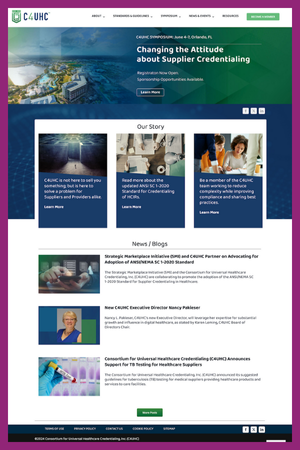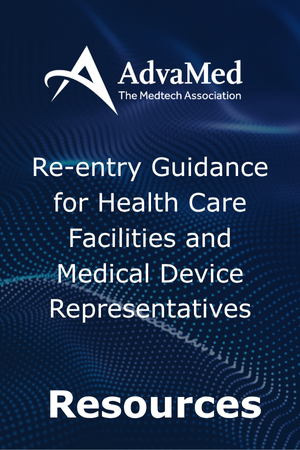
Health Care Industry Representatives (HCIRs)
Who Are HCIRs?
Health Care Industry Representatives (HCIRs) are specialists from medical technology companies who provide training and technical support for medical devices used in hospitals and operating rooms (ORs). They are sometimes called “company representatives” or “reps” and function to help surgeons and medical teams understand how to safely and effectively use and maintain medical devices
AdvaMed Code of Ethics – HCIR Principles
Section XIII of the AdvaMed Code of Ethics concerns HCIRs providing technical support in the clinical setting. It states that medtech companies should apply the following principles:
- HCIRs should enter and be present in the clinical setting only at the request of and under the supervision of a Health Care Professional.
- Company representatives should be transparent that they are acting on behalf of the Company in a technical support capacity.
- The patient should be informed of the presence and purpose of the HCIR in the OR and give written, informed consent.
- Company representatives should not interfere with a Health Care Professional’s independent clinical decision-making.
- HCIRs should not be providing direct patient care or making clinical decisions.
- Company representatives should comply with applicable hospital or facility policies and requirements, including patient privacy and credentialing requirements.
- A Company’s technical support should not eliminate an overhead or other expense that the Health Care Professional should otherwise incur while providing patient care.
Role and Value of HCIRs – What Do HCIRs Actually Do?
HCIRs often possess deep expertise on their companies’ products – especially new or highly specialized medical devices – that complements the clinical team’s knowledge and skills.
HCIRs primarily help in three ways:
- Device Training:
- They provide detailed education on new medical devices or complex device systems to surgeons, nurses, and technicians. They often conduct in-service training sessions and ensure the surgical team is familiar with the latest technology.
- They educate medical staff on correct device preparation, assembly, usage, and handling procedures. For example, a rep might teach proper assembly of a new implant system or demonstrate usage of a sophisticated surgical tool.
- In-Procedure Technical Support:
- During procedures, HCIRs serve as an expert resource on technical details of the device.
- Many medical devices undergo frequent innovations to improve safety, efficacy, and functionality, with some product life cycles measured in months. This rapid innovation cycle emphasizes the need for an interactive resource that can communicate the nuances and technical details concerning the device being utilized by a clinician.
- Moreover, some procedures involve numerous device components, the possible combinations of which may vary widely. The technical support provided by HCIRs ensures the safe and effective utilization of these devices.
- While physicians make every effort to keep abreast of new device information, it is unreasonable to expect a physician to keep pace with the vast array of evolving devices and their unique features at the point of care.
- HCIRs may also calibrate devices or input settings according to the physician’s specifications. For example, a representative could assist the surgical team in calibrating a laser or programming a pacemaker to the surgeon’s specifications.
- HCIRs can provide real-time technical guidance. They may need to explain how a medical technology’s unique settings and technical controls function and may make recommendations.
- This support helps procedures proceed efficiently and can improve patient outcomes by optimizing device performance.
- Device Logistics, Maintenance, & Repairs:
- HCIRs may assist the clinical/operating room team to ensure that the appropriate range of necessary devices and accessories are available during a procedure, especially when dealing with Medical Technology that involves multiple devices and/or accessories.
- Their presence can minimize delays if equipment issues arise. HCIRs coordinate with hospital staff to manage loaner instruments or specialty implants, making sure the OR is properly equipped for a given case.
- Other HCIRs assist with maintaining and repairing medical equipment.
Credentialing and Standardization

What is Credentialing?
HCIR Credentialing refers to a healthcare facility’s process of verifying the qualifications and background of individuals representing external companies who may require access to healthcare facilities as part of their job function, for example to provide technical support for medical devices during a procedure at the request of the attending physician.
Credentialing Inefficiencies can be Improved through Standardization
The proliferation in varied credentialing requirements, coupled with the lack of reciprocity granted between facilities and the frequent demand for primary source verification (only accepting a credentialing document from the primary source that produces the document), has resulted in inefficient and duplicative credentialing.
Currently, the U.S. health system’s total cost for supplier credentialing, with unstandardized and duplicative credentialing requirements, has been estimated at over $1 billion annually.
ANSI American National Standard
- AdvaMed endorses the broad adoption of the ANSI American National Standard for Supplier Credentialing in Healthcare (ANSI/NEMA SC 1-2020 Standard for Supplier Credentialing in Healthcare) to improve compliance and reduce inefficiencies. [Free download available here]
- Suppliers who comply with the ANSI SC 1-2020 Standard are helping to ensure that their reps are appropriately screened and trained, and that they meet the highest level of standards.
- Providers who embrace the credentialing requirements in the ANSI SC 1-2020 Standard help free the healthcare system from duplication of effort, redundancy of processes, and excessive labor time.
- Individuals who participated in the revision of the 2019 ANSI standard into the 2020 version included professionals from the following organizations:
- FDA
- Association of periOperative Registered Nurses (AORN)
- Avera Health
- Cleveland Clinic
- Intermountain Healthcare
- Mayo Clinic
- Memorial Sloan Kettering Cancer Center
- OhioHealth
- AdvaMed
Collaborations

Consortium for Universal Healthcare Credentialing
AdvaMed participates in the Consortium for Universal Healthcare Credentialing (www.C4UHC.org), which comprises healthcare providers, suppliers, and industry associations. Its mission includes creating and advancing an American National Standard for Supplier Credentialing in Healthcare for a streamlined credentialing process to protect patient safety and confidentiality, eliminate duplicative efforts and costs, and meet the needs of healthcare providers and suppliers.

Re-Entry Guidance for Health Care Facilities and Medical Device Representatives
AdvaMed collaborated with the American Hospital Association (AHA), the Association of periOperative Registered Nurses (AORN) to issue re-entry guidance for health care facilities and medical device representatives during the COVID-19 pandemic. This joint guidance (endorsed by 27 health care organizations) outlined how to safely bring reps back into hospitals and ASCs– addressing issues like providing personal protective equipment (PPE) for reps, following facility screening protocols, and using remote support when possible.
News

June 20, 2025 – U.S. Department of Health and Human Services Office of Inspector General (OIG) issued an unfavorable advisory opinion OIG Advisory Opinion 25-04 (AO 25-04)
Brief Summary:
Proposal: A medical device manufacturer would cover the costs of its customers (hospitals and ASCs) for a third-party firm to perform exclusion screening & monitoring (i.e., exclusion from federal health care programs) and other compliance checks.
Financial terms: The device manufacturer would pay an annual, per‑customer subscription—about $450,000 total per year—directly to the screening vendor.
OIG Analysis: The proposed payment implicates the Federal Anti-Kickback Statute because paying for exclusion screening fees covers a cost that customers would otherwise incur. OIG flagged anti‑competitive “gatekeeper” concerns and the potential for inappropriate steering toward the manufacturer over competitors unwilling to pay.
Outcome: OIG issued an unfavorable advisory opinion, concluding the arrangement could lead to civil monetary penalties and exclusion if the intent to induce referrals exists.
July 1, 2025- U.S. Department of Health and Human Services Office of Inspector General (OIG) issued an unfavorable advisory opinion OIG Advisory Opinion 25-08 (AO 25-08)
Proposal: A medical device manufacturer proposed paying licensing fees to a third-party vendor so its sales representatives could access the vendor’s “bill-only” electronic portal used by certain hospitals and ASCs to process real-time purchases of surgical devices.
Financial terms: The vendor would charge roughly $395 per representative license annually, potentially totaling about $1.2 million per year if all 3,000 representatives required access. The manufacturer would incur these costs solely to meet customer requirements, not for any operational benefit.
OIG Analysis: The arrangement implicates the Federal Anti-Kickback Statute because the manufacturer would be covering costs tied to customers’ purchasing processes, potentially conferring an improper financial benefit. OIG highlighted that the fees lacked commercial reasonableness, could distort competition, and risked steering customers toward the manufacturer’s products.
Outcome: OIG issued an unfavorable opinion, finding that the arrangement could constitute prohibited remuneration and lead to sanctions, including civil monetary penalties and exclusion, if intent to induce referrals were present.
Resources and Endorsed Documents
ACS Revised Statement on Health Care Industry Representatives in the OR – American College of Surgeons (ACS), October 2016. Guidelines and limitations for HCIRs in the surgical setting.
AORN Position Statement on the Role of the Health Care Industry Representative in Perioperative Settings – Association of periOperative Registered Nurses (AORN), 2020. Outlines the perioperative nursing perspective on HCIRs and their accountability for patient safety and privacy.
C4UHC Blog – C4UHC Founder Rhett Suhre: What Are ANSI Standards and How Do They Increase Efficiencies in Patient Care?
Mayo Clinic White Paper – “Standardizing Credentialing Requirements for Health Care Industry Representatives” – Mayo Clinic Supply Chain, June 1, 2012 (Bruce Mairose). Landmark report recommending unified national standards for HCIR credentials, developed with input from hospitals, industry, and regulators.
ANSI/NEMA SC 1-2019 Standard for Supplier Credentialing in Healthcare, published March 2019. Establishes a national benchmark for credentialing supplier representatives (covering immunizations, background checks, training, etc.) Scope and table of contents of the 2019 standard defining credentialing requirements for HCIRs.
ANSI/NEMA SC 1-2020 Standard for Supplier Credentialing in Healthcare – Updated Standard, published Dec 17, 2020. Free electronic download available via NEMA. Expands on SC1-2019, incorporating COVID-19 related updates and clarifications for credentialing HCIRs.
“Medical-Device Makers’ Representatives in the O.R.: Patient-Care Benefits and Legal Ramifications” – Washington Legal Foundation, Legal Backgrounder by Max Heerman & Daniel Smulian, Apr 21, 2017. Supports role of device reps in ORs as technical advisors, not liable when acting within AdvaMed-defined limitations.
AdvaMed Comments on DOJ State Law RFI_Docket No OLP182 – Sept. 15, 2025, AdvaMed comments on DOJ’s Interstate Commerce RFI recommending federal adoption of the ANSI SC 1-2020 supplier credentialing standard through CMS’s Medicare Conditions of Participation and exploring a national platform to streamline credentialing and bill-only purchasing.